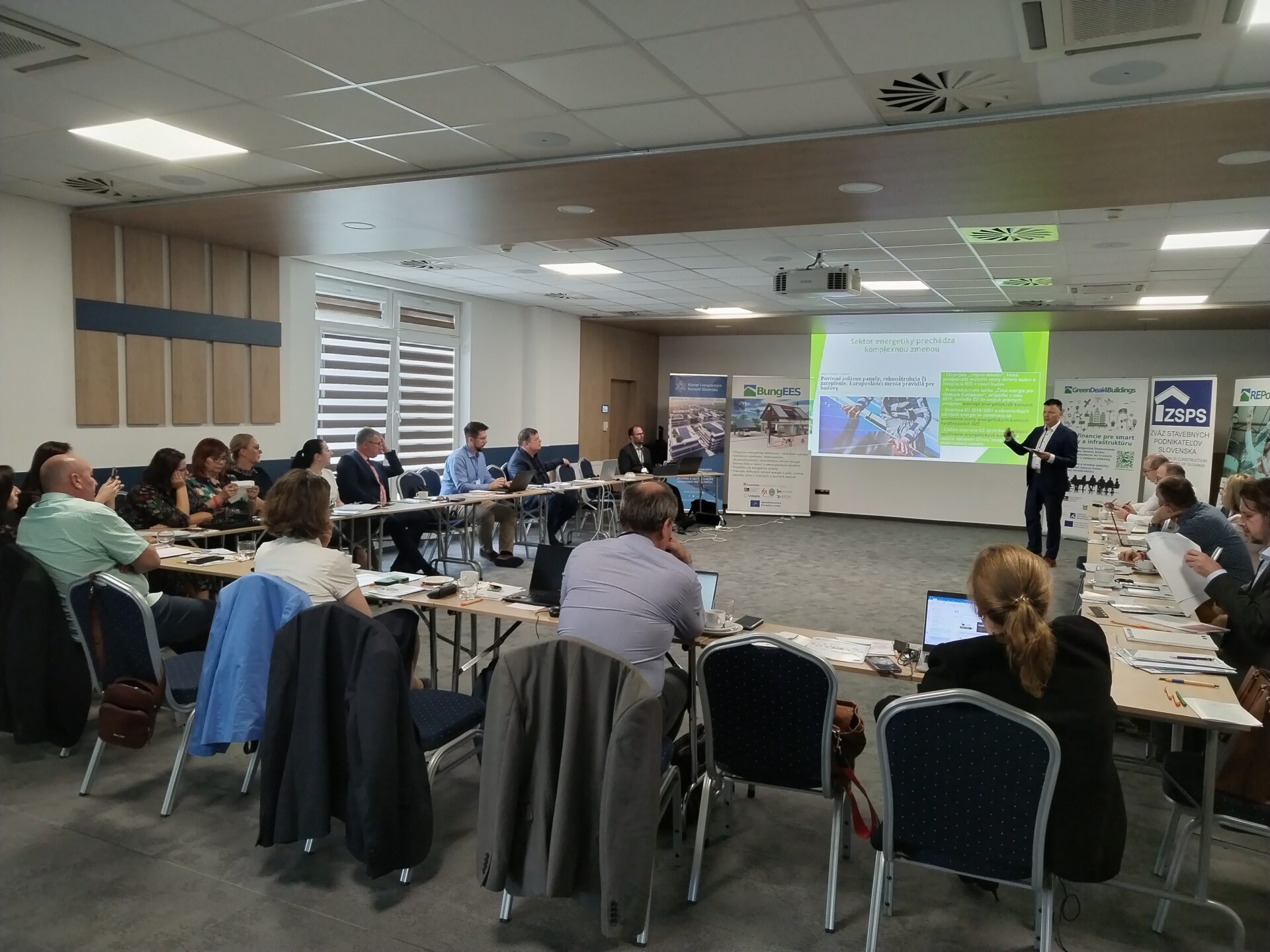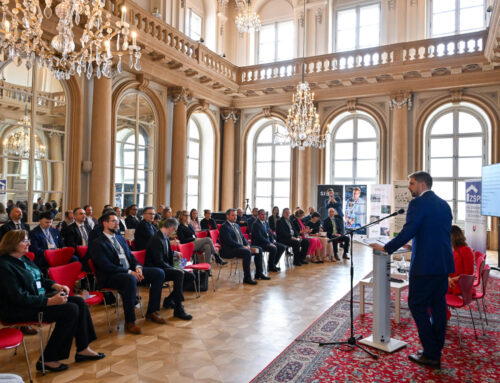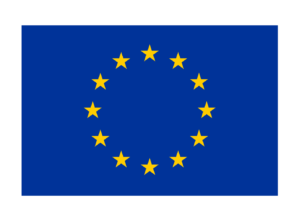The 12th Stakeholder Meeting was aimed at expanding and continuing the cooperation between stakeholders who directly supported the Green Deal for Buildings Roadmap with a letter of support. It was divided into two days with a strong emphasis on networking. At the same time, expectations and options for addressing the 48 measures were communicated. The aim was also to find new challenges and partnerships. Stakeholders who expressed their willingness to take over the patronage of some of the measures are also expected to work actively after the end of the project.
The meeting was moderated by Stanislav Laktiš from SIEA and the event was opened by Pavol Kováčik, President of ZSPS and Jiří Karásek, Senior Consultant, SEVEn. Mr. Kováčik stressed the need for a coordinated approach in the development of the construction and energy sectors. Since 2019, when the project was conceived as a proposal, the requirements and rules of the construction and energy sector have been changing at an extremely fast pace and those states and investors that do not keep up are losing their competitiveness in the market. In some EU countries there are coordinating bodies for the implementation of standards and directives, but in Slovakia we do not see such a coordinated approach, which causes problems in the development and resolution of problems. Jiří Karásek described the course of the round tables in the Czech Republic, where some of the measures of the roadmap are already starting to be implemented, e.g. the ESG topic, where several stakeholders have joined together and prepared a joint project.
This was followed by a tour de table where individual participants expressed their expectations for the future of the construction and energy sector and what the roadmap’s actions should deliver. Expectations are particularly in the following areas:
- Energy efficiency and how to improve it and meet it’s targets,
- improving the public procurement process and focusing on quality, especially for public buildings,
- decentralisation of the energy sector – energy communities, proper involvement and support from local governments,
- consumer-focused transformation – consumer protection, prosumers, collective purchasing – economies of scale, better information on energy issues, energy literacy,
- addressing energy poverty,
- high quality renovation of residential buildings,
- education – of students, teachers, craftsmen, public administration employees, quality material and technical provision of schools and training centres, setting a clear vision for the construction and energy sector so that schools know how to equip their workplaces and what technologies to buy and educate, linking with practice, the area of soft skills of the younger generation, the application of graduates on the labour market, building a lifelong career from the beginning of their studies, how to make the construction and energy sector more attractive to students and then keep them in Slovakia,
- industrialisation of the construction sector,
- follow-up on the roundtables by the government.
This was followed by a presentation by Mr. Modrák from the Cluster of Energy Communities of Slovakia on the topic of energy decentralisation in Slovakia. He described the current situation, the legislation and the starting initiatives in the field of decentralization of energy and energy communities, such as in Bratislava, Petržalka municipality where the municipality itself is involved, as well as in the Lower Liptov region, where a community is being established within the Local Action Group Lower Liptov. He expressed the need to build a decentralised energy system, supporting resources owned by consumers. This can be, for example, agri-voltaics. Decentralised sources also have the benefit of eliminating energy losses in long-distance electricity transmission. Setting up internal legal, financial and energy relationships is important in energy communities – a thorough legal analysis and the preparation of model statutes and contracts is needed. They need to be economically viable for the consumer and consumers need to understand the benefits of green transformation and energy communities, e.g. they need to be assured that someone will help them solve their problems. From a technical point of view, smart meters need to be installed. These will provide, among other things, an overview of energy consumption. Before installing RES or engaging with the community, this can help to change consumer behaviour, which will help to better adjust within the community or RES installation. There is a need for a kind of “cookbook” for energy communities, i.e. a step by step guide on how to set up and run such a community.
This was followed by a presentation by Ms Zuzana Šulková from the Ministry of Economy on the establishment of the European Energy Efficiency Financing Coalition (EEFIC), a platform building on the platform of the EEFIG (Energy efficiency financing institutions group) and the Sustainable Energy Investment Forum. The aim is to strengthen cooperation between national policy makers and financial institutions and other stakeholders. An important and new element is the establishment of national hubs in all EU Member States. The EEFIC will involve:
- European Commission – Overall management of the EEFIC, ensuring consistency of the initiative between the Centres with each other and between other EEFIC levels, support to national authorities,
- Management of the National Centre – manages the meetings of the Centre and monitors its activities,
- Secretariat – provides administrative support (meetings, logistics, …), provides technical support to national experts in support of individual activities of the Centre, supports the EC in linking the activities of the Centre to other EEFIC structures,
- Relevant national actors – financial institutions in the national market, other stakeholders relevant to the business chain (energy companies, project developers, industry associations and their representatives).
The National Centres will carry out several tasks, such as:
- Creation and coordination of Working Groups (e.g. sectoral approach (households, industry, agriculture, MsP, …)).
- Consultations with stakeholders – e.g. through webinars, conferences.
- Possible tasks (to be specified in the Work Plan):
- proposing legislative and regulatory changes,
- work on the blending of financial products and on reducing their risk,
- increasing the implementation of EE measures from energy audits,
- working on building renovation solutions,
- coordination of one shop shops and tools to support project preparation.
Financial institutions have the opportunity to participate in EEFIC calls – they will be on the EEFIC website. The challenge will be to motivate private investors to participate in achieving EE objectives. The national hubs are expected to be operational in 2025. Partners and stakeholders of the Green Deal for Buildings project have expressed their willingness to actively participate and assist in organising the implementation of the meetings, as well as to use their communication channels. Ministry of Economy accepted the offer. In his presentation, František Doktor explained further plans for the Green Deal for Buildings. Now the roadmap will be completed with procedures, milestones, timeframes and steps for fulfilling the actions, stakeholders will be assigned to them according to what they have indicated in the support letter. All discussions and comments will be reflected in these roadmaps and will then be made public.






